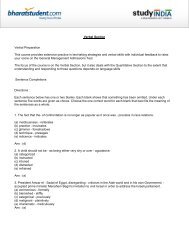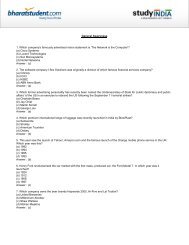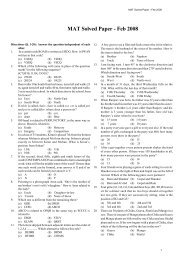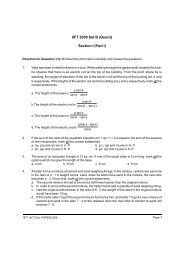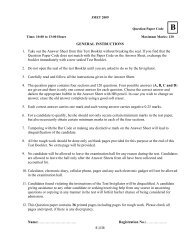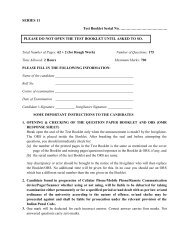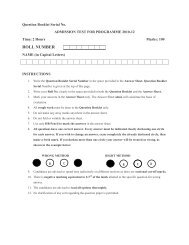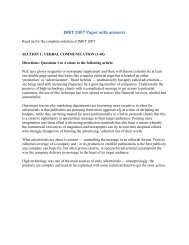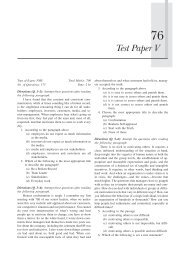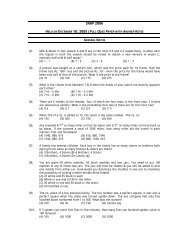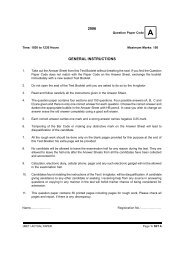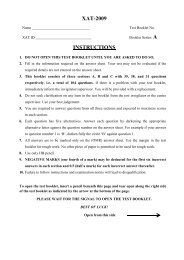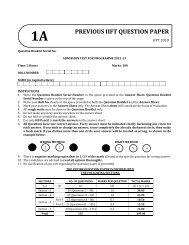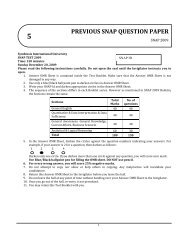PREVIOUS FMS QUESTION PAPER
PREVIOUS FMS QUESTION PAPER
PREVIOUS FMS QUESTION PAPER
Create successful ePaper yourself
Turn your PDF publications into a flip-book with our unique Google optimized e-Paper software.
libraries, making tens of thousands of books available<br />
and searchable online.<br />
In the earliest days of search engines, people were<br />
amazed and delighted to stumble across the<br />
information they sought; eureka moments were<br />
unexpected surprises, said Yahoo!’s cofounder Jerry<br />
Yang. “Today their attitudes are much more<br />
presumptive. They presume that the information<br />
they’re looking for is certainly available and that it’s<br />
just a matter of technologists making it easier to get to,<br />
and in fewer keystrokes,” he said. “The democratization<br />
of information is having a profound impact on society.<br />
Today’s consumers are much more efficient– they can<br />
find information, products, and services, faster<br />
[through search engines] than through traditional<br />
means. They are better informed about issues related<br />
to health, leisure, etc. Small towns are no longer<br />
disadvantaged relative to those with better access to<br />
information. And people have the ability to be better<br />
connected to things that interest them, to quickly and<br />
easily become experts in given subjects and to connect<br />
with others who share their interests."<br />
Google’s founders understood that by the late 1990s<br />
hundreds of thousands of Web pages were being added<br />
to the Internet each day, and that existing search<br />
engines, which tended to search for keywords, could<br />
not keep pace. Brin and Page, who met as Stanford<br />
University students in computer science in 1995,<br />
developed a mathematical formula that ranked a Web<br />
page by how many other Web pages were linked to it,<br />
on the assumption that the more people linked to a<br />
certain page, more important the page. The key<br />
breakthrough that enabled Google to become first<br />
among search engines was its ability to combine its<br />
PageRank technology with an analysis of page content,<br />
which determines which pages are most relevant to the<br />
specific search being conducted. Even though Google<br />
entered the market after other major search players, its<br />
answers were seen by people as more accurate and<br />
relevant to what they were looking for. The fact that<br />
one search engine was just a little better than the<br />
others led a tidal wave of people to switch to it. (Google<br />
now employs scores of mathematicians working on its<br />
search algorithms, in an effort to always keep them one<br />
step more relevant than the competition).<br />
PP-02 2A.9<br />
<strong>FMS</strong> Dec 2010<br />
For some reason, said Brin, “people underestimated the<br />
importance of finding information, as opposed to other<br />
things you would do online. If you are searching for<br />
something like a health issue, you really want to know;<br />
in some cases it is a life-and-death matter. We have<br />
people who search Google for heart-attack symptoms<br />
and then call nine-one-nine.” But sometimes you really<br />
want to inform yourself about something much<br />
simpler.<br />
27. Which of the following is not a correct statement?<br />
(1) Informing is supply chain management<br />
(2) Informing is the ability to build and deploy<br />
your own supply of information<br />
(3) Knowledge makes you self-directed and selfempowered<br />
(4) Knowledge and information reduce inequality<br />
28. According to the passage,<br />
(1) PageRank technology analyses the relevance of<br />
information<br />
(2) Google search does not determine which pages<br />
contain relevant information<br />
(3) Google was the first search player on the web<br />
(4) Yahoo entered the market after Google<br />
29. The author of the passage suggests that most<br />
people use Google to search for:<br />
(1) Jobs (2) Sex<br />
(3) God (4) All of the above<br />
30. Which of the following is a correct statement?<br />
(1) More than 70 percent of people search for God<br />
on Google<br />
(2) Less than 2 percent of people search for God<br />
on Google<br />
(3) More than 50 percent of people search for sex<br />
on Google<br />
(4) About 30 percent of people search for<br />
wrestling on Google<br />
31. According to the author of the passage,<br />
(1) Google has made the world flat<br />
(2) Google has revealed the history of the planet



